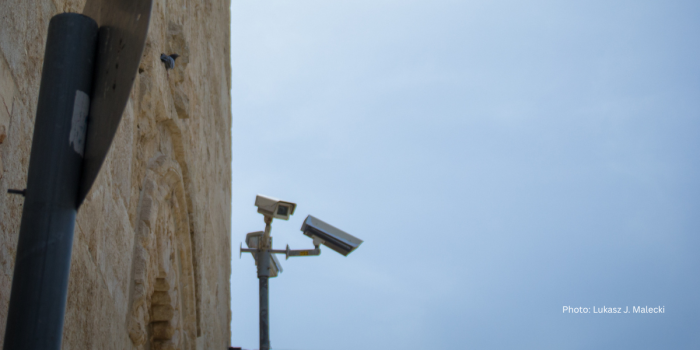
In a response to the UN Special Rapporteur on freedom of peaceful assembly and of association’s call for input for the HRC62 thematic report on “Impact of digital and AI‑assisted surveillance on assembly and association rights, including chilling effects”, Al-Haq details how Israel’s surveillance architecture – spanning widespread use of facial recognition technology (FRT), database‑driven policing, and dense city‑wide CCTV networks – has entrenched its settler-colonial apartheid system and severely curtailed the fundamental rights of the Palestinian people, including the freedoms of association and peaceful assembly.
Israel’s digital and AI‑assisted surveillance ecosystem represents a governing structure and key component of its genocidal, settler-colonial apartheid system. By weaponizing surveillance tools exclusively against Palestinians throughout the Occupied Palestinian Territory (OPT) for continuous monitoring, profiling, post‑event identification, and punishment, it cements its apartheid regime on both sides of the Green Line, unlawful occupation of Palestine and eliminates the prospects of Palestinian self-determination.
The submission documents how tools such as “Blue Wolf” and “Red Wolf” interface with “Wolf Pack,” a database of Palestinian biometric and biographic data used to automate checkpoint decisions and target individuals for searches, questioning, or detention. In East Jerusalem, the upgraded “Mabat 2000” CCTV network saturates public space with cameras capable of facial recognition. This sophisticated digital surveillance grid is weaponised against Palestinians throughout the OPT, producing a pervasive chilling effect that further segregates and fragments Palestinian society and empties civic space both on the ground and online:
“Israel’s digital panopticon turns fundamental freedoms into conditional privileges, decided by opaque algorithms built on discriminatory datasets (…) By automating movement controls and post‑event identification, these systems silence dissent, fragment communities, and directly obstruct the Palestinian people’s exercise of their inalienable right to self‑determination.”
Since October 2023 Israel has intensified AI‑assisted surveillance and predictive policing, including at checkpoints and in urban hubs and protest sites such as Damascus Gate, where militarised watchtowers and dense camera arrays deter gatherings and protests. Gamified data‑capture practices have incentivised mass, non‑consensual biometric enrolment of Palestinians, while AI‑assisted classification at checkpoints determines who is questioned, detained, or denied passage. These practices have escalated self‑censorship and dismantled the spontaneity essential to organising, network‑building, and collective action.
The submission further situates Gaza within an expanding battlefield of algorithmic warfare, where the denial of freedom of association and assembly in Gaza has been taken to extremes. AI systems such as “Lavender”, “Where’s Daddy” and “Gospel” have been used to generate “kill lists” of Palestinians in Gaza with an alleged affiliation to Hamas – a political organisation in Gaza, with a military wing. This powerfully showcases how unaccountable automation, used to target civilians and destroy thousands of family homes, amplifies unlawful conduct and erodes the core guarantees of international human rights and humanitarian law.
These harms are compounded by opaque, biased algorithms built on discriminatory datasets, which misidentify and over‑police Palestinians while offering no meaningful due‑process safeguards or avenues for redress. The constant possibility of being watched, misidentified, or punished has produced widespread fear and hopelessness, undermining everyday life, community cohesion, and the willingness to participate in public affairs. Consequently, the social and political networks essential to association and assembly are dissolved or simply prevented from developing.
By eroding spontaneity and the freedom to gather, speak, and organise, the Israel’s digital and AI-assisted surveillance networks strike at the very conditions necessary for the Palestinian people to exercise their inalienable right to self‑determination. Al-Haq’s submission demanded that Israel’s policy of mass surveillance of Palestinians must be brought to an immediate end. It stressed that urgent constraint, independent oversight, and rights-protective remedies are required to restore civic space and the procedural conditions necessary for collective political will formation – without which the individual freedoms of association and assembly, and in turn the collective right of the Palestinian people to self-determination, cannot be enjoyed.
Consequently, Al-Haq made the following recommendations to UN Special Rapporteur, Ms. Gina Romero:
-
Demand Israel impose an immediate, unconditional moratorium on all facial recognition and biometric scanning targeting Palestinians in the occupied West Bank (including Mabat 2000, Blue Wolf and Red Wolf);
-
Demand Israel end practices and policies that predicate arrest or movement restrictions on sociopolitical engagement and social media activity recorded by digital and AI surveillance, thereby addressing the root causes of pervasive self-censorship among Palestinian youth;
-
Initiate an independent audit, leading to the verifiable and immediate destruction of the Wolf Pack database due to its intrinsically discriminatory design, its violation of the fundamental freedoms of Palestinians and their right to self-determination, and the non consensual nature of the data collection;
-
Request a ban on all trade in Israeli surveillance systems, including relevant software, FRT, and components;
-
Call on Third States and the international community to hold corporate and state actors accountable, both criminally and through sanctions, for developing, funding, or exporting technologies designed to enforce discriminatory, apartheid systems and sustain unlawful regimes;
-
Provide sustained support to community-led initiatives, Palestinian civil society actors and impartial humanitarian organisations that empower the Palestinian people and promote their psychological well-being in response to it being detrimentally impacted by Israel’s digital panopticon and dehumanisation of Palestinian men, women and children;
-
Use all means necessary to implement the recommendations in the ICJ Advisory Opinion on Legal Consequences arising from the Policies and Practices of Israel in the Occupied Palestinian Territory, including East Jerusalem.
The full submission can be accessed here.

